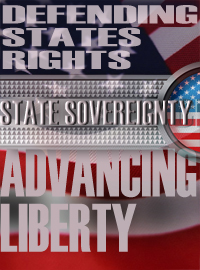| AGs: States’ Sovereignty Advances Liberty |
 |
|
By Quin Hillyer
Thursday, September 20 2012 |
The Center for Individual Freedom’s “State Sovereignty Project” is being planted in soil already made fertile by resolute actions of conservative state attorneys general. The antiquated term of “states’ rights” doesn’t do justice to their efforts, because they really are defending the states’ ability to look out for their citizens’ individual rights, prerogatives and well-being. Consider Scott Pruitt of Oklahoma. So dedicated is he to the principle of “federalism” – the vertical diffusion of power allowing the states on some subjects to limit the dangerous centralizing power of the federal government – that he has assigned a team of attorneys to a separate “office of federalism” devoted exclusively to fighting abuses by the feds. Within two months, his team was fighting expensive, overly burdensome, bureaucratic meddling with small community banks, without proper rulemaking authority, by the Federal Deposit Insurance Corporation. Due to Pruitt’s efforts, the FDIC backed down. On another front, Pruitt has taken the lead in fighting “regulation by litigation” – a practice by which outside activist groups file apparently pre-arranged lawsuits against the Environmental Protection Agency. Quite amazingly, the EPA then enters a “consent decree” with a court within a single day, granting the activists what they wanted and binding multiple states to expensive restrictions without ever letting the states have a chance even to comment on what amounts to a new federal rule. Going through the normal rule-making process, open to public comment and review, might take years; this way, the EPA does it overnight without benefit of sunlight or procedural fairness. Finally, in a significant interim victory, Pruitt in June won an injunction from the 10th Circuit U.S. Court of Appeals blocking (for now) an EPA “regional haze” rule whose practical effects would be increased electric bills for Oklahoma consumers of as much as 20 percent in three years. Those threatened costs to consumers, Pruitt told me, show that “these issues involving federalism are real issues, they aren’t just academic: They affect people in your state in a very personal way.” Likewise, Texas AG Greg Abbott has won two big victories in other cases against the EPA, with the U.S. Court of Appeals for the DC Circuit blocking something called the “Cross-State Pollution Rule” and with the Fifth Circuit Court of Appeals overturning EPA’s objections to Texas’ own air permitting program – a program put in place, by the way, not by some right-wing regime supposedly intent on despoiling the environment, but by liberal former Governor Ann Richards. “State attorneys general have proven to be the last line of defense,” Abbott told me, “against a federal government that is growing too large, spending too much, and reaching too deeply into our lives.” On September 14, the Heritage Foundation hosted a forum on state sovereignty featuring Oklahoma’s Pruitt along with AGs Luther Strange of Alabama, Sam Olens of Georgia and Greg Zoeller of Indiana. At stake, Strange said, is nothing less than the rule of law itself, which he said acts (among other things) as a lure for foreign investors (such as automobile and aerospace companies in Alabama) to build plants and create jobs here in the United States. “They come here,” he said, “because contracts will be enforced…and property rights will be protected.” Federal regulators often seem unconcerned about those rights, he said – but when states protect the rule of law by keeping the feds in check, it’s not just a remote power struggle, but a way to advance the material opportunities for the states’ workers. Zoeller, meanwhile, pointed to the second part of the Supreme Court’s decision on ObamaCare, the 7-2 holding invalidating the national government’s attempted “coercion” of states into expanding their Medicaid programs, as a huge victory for state sovereignty. “It was an invitation from the Supreme Court,” he said, “to engage [on the issue of] the proper role of federalism.” Lesson: “States need to stop just defending our sovereignty and start challenging [in areas] where our sovereignty has been encroached by the federal government.” Olens, meanwhile, who joined Abbott’s aforementioned fight (and victory) against the Cross-State Pollution rule, quoted a great line from the decision written by Judge Brett Kavanaugh castigating the feds because “EPA’s approach punishes the states for failing to meet a standard that EPA has not yet announced and that states did not know.” The best line at the Heritage event came from Zoeller, who worked for years in Washington before returning to Indiana: “I never trusted the federal government when I worked for it – and now that I’m attorney general, I’m paid not to trust it.” Moderating the event was former U.S. Attorney Ed Meese, who noted that oftentimes a victory for one state in such a case ends up protecting the interests of citizens of other states as well. “This is service to the entire nation,” Meese said. Indeed it is. |
Related Articles : |
























